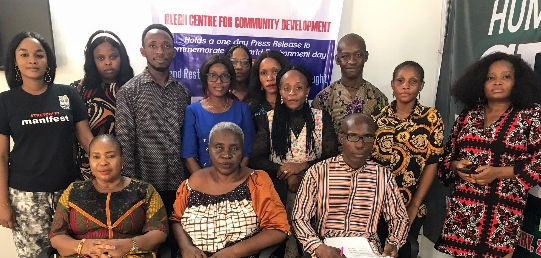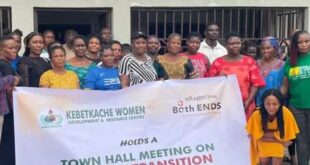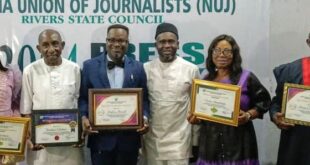By Kelechi Nwaucha
Even as the Niger Delta environment and ecosystem continue to face heavy assault from oil pollution and related challenges, OLEGH Centre for Community Development has used the opportunity of this year’s World Environment Day to highlight the vital role women and rural communities play in sustainable land use.
Addressing the media on Wednesday June 5, 2024, in Port Harcourt, OLEGH’s Program officer, Rebecca Apenu, said that in celebration of the 2024 World Environment Day, “OLEGH Centre for Community Development joins hands with the women and communities of Nigeria, particularly in the Niger Delta, to highlight the precarious issues of this year’s theme ‘Land Restoration, Desertification, and Drought Resilience.'”
She noted that the slogan ‘Our Land, Our Future,’ underscores “the vital role women play in sustainable land management, conservation, and climate resilience,’ adding that OLEGH is dedicated to empowering women to lead the charge in addressing these urgent environmental challenges.
In a release tagged ‘Empowering Women, Transfoming Comnmunities,’ OLEGH’s Apenu listed environmental challenges facing communities in the Niger Delta to include land degradation, desertification and drought, climate change impacts, gender inequality among others.
She said the Niger Delta “endures severe land degradation due to oil spills, continuous gas flaring, soil erosion, deforestation, and the extensive network of oil pipelines. The loss of mangrove forests and arable land from coastal erosion has led to diminished agricultural productivity, threatening local farmers’ livelihoods.
“This degradation impacts food security and leads to a loss of biodiversity and ecosystem services. Restoring the land equates to restoring hope, life, economic prosperity, and livelihoods,” Apenu said.
She further noted that the increasing frequency and severity of droughts pose significant threats to rural communities.
Water scarcity, she said “impacts agriculture, leading to crop failures and reduced food availability, exacerbating poverty and hunger among the most vulnerable populations. Desertification further reduces the land’s ability to support life, making the implementation of sustainable practices crucial.”
These, Apenu noted, increase climate change impact, with communities in the Niger Delta facing increased effects of climate change, including flooding, abnomal temperatures, sea level rise, and unpredictable seasons, which disproportionately affect rural areas.
“These environmental shocks undermine community resilience and increase vulnerability to future climate-related disasters. Efective adaptation strategies are essential to mitigate these impacts and protect our livelihoods.”
Highlighting the impact on gender inequality, OLEGH’s Program officer noted that despite their crucial role in agriculture and natural resource management, women often lack access to land resources, and decision-making processes. “This gender disparity limits their ability to contribute effectively to sustainable development and climate resilience efforts. Empowering women is essential for achieving broader environmental and social goals.
“On this World Environment Day, we urge communities to collaborate and empower women to transfom our communities. Together, we can: Restore degraded lands and promote sustainable land use practices.
“Government and extractive companies should invest in sustainable agriculture practices, such as agroforestry, permaculture, and regenerative agriculture. These practices enhance soil fertility, reduce erosion, boost biodiversity, and create resilient ecosystems. Communities can adopt climate-resilient agricultural practices and improve water management systems, including using climate-resilient crops and animal varieties and implementing earty warning systems for droughts and floods.
“We call on the govermment to implement policies and programs that promote sustainable land use and management, provide resources and funding for climate change mitigation and adapaion initiaives, ensure equal acoess to land resources, and decision-making processes for women,” she said.
Chief Constance Meju, Publisher of the National Point Newspaper, noted that “gender inequality and women are the most affected when it comes to climate change impacts. Women are the most affected so that’s why we focus more on women.
“When we talk about droughts, we don’t have droughts here (in Niger Delta), but we are suffering the effects of droughts. The presence of the headsmen, the damage that they do to our farms, and the farms that they damage are the farms of the women, because women are the major farmers here in the Niger Delta.
“Also, the dangers that it poses. Last month a woman was raped in one of the communities in Eleme, in her farmland. And you know, Eleme women have been complaining seriously about headsmen.
“Secondly, the question of land degradation has caused so much problem in the Niger Delta. You find that women are affected. Last year in Okuzi, while the government was trying to fight people who were doing illegal refining, a woman working on her farm received fire burns from the sprays that the Air Force released, so she had to be hospitalized for some time.
“These are the ways that it affects women. And also, it impoverishes them seriously. That’s why OLEGH is very concerned about the welfare of women in relation to the environment,” Chief Meju said.
On challenges before NGOs, OLEGH’s Kelechi Uzoma said “we need more government response. There are some things that the NGO can’t achieve alone, no matter how we go about it. We still need that nod from the government. We still need them to bring up policies and strategies.
“There are some things that are even in just the Exclusive list, that are not in the Concurrent list or Residual list. Some of the matters around environment are even on the Exclusive list.
“So we need that collaboration, we need that buy in from the government to actually achieve certain things when it comes to climate change and our environment.”
Uzoma said OLEGH “does a lot of work on community sensitization, especially for communities which are marginalized. So we need support to close these gaps. We need support and collaborations, from government and others, to sensitize them, for them to know their environmental rights and all.”
 PH Mundial – Port Harcourt Online Newspaper News Across The Region
PH Mundial – Port Harcourt Online Newspaper News Across The Region





